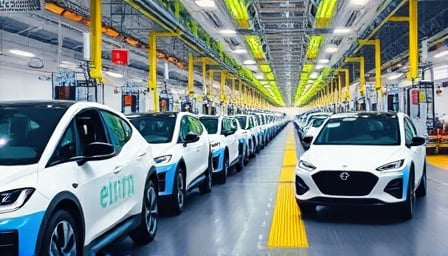Volkswagen AG Sustains Modest Gains Amid Strategic Customer‑Experience Initiatives
Stock Performance and Market Context
Volkswagen AG’s shares have demonstrated a modest yet positive trajectory over the past twelve months. An initial investment of €100 has appreciated to approximately €111, reflecting a 11 % gain for investors who entered the market a year ago. While this increase is moderate compared to the volatility of the broader equity markets, it underscores the company’s resilience within the highly competitive automotive sector.
The stock’s performance cannot be viewed in isolation. The DAX 40 index has exhibited fluctuations in recent sessions, driven by macroeconomic signals such as the United States Federal Reserve’s decision to lower interest rates. Lower borrowing costs tend to stimulate consumer spending on durable goods, including automobiles, and may support a gradual rebound in auto sales across Europe. Nevertheless, the European market remains subject to other pressures—including supply‑chain disruptions, commodity price volatility, and evolving regulatory standards—factors that continue to temper investor sentiment.
Customer‑Experience Collaboration in the United Kingdom
In a bid to strengthen its consumer engagement strategy, Volkswagen Group UK has entered into a partnership with Medallia, Inc. and Ipsos. The alliance seeks to refine the measurement of customer experience (CX) and expand the depth of insight into consumer needs and preferences. Medallia’s real‑time feedback platform, coupled with Ipsos’s expertise in social research and data analytics, provides a robust framework for capturing both quantitative and qualitative signals.
From a corporate‑strategy perspective, this collaboration aligns with Volkswagen’s broader objective of differentiating itself through service excellence. By embedding advanced CX analytics into its sales and after‑sales processes, the group can anticipate and respond to shifting customer expectations, thereby enhancing brand loyalty and potentially boosting the lifetime value of each customer.
Pricing Strategy for the Grand California
Volkswagen’s Grand California, a model positioned at the intersection of automotive engineering and outdoor lifestyle, is currently being offered at discounted rates through the Carwow marketplace. The promotion delivers a tangible value proposition to consumers who desire a premium, camping‑ready vehicle at a more accessible price point. By leveraging third‑party e‑commerce platforms, Volkswagen can broaden its distribution channels while maintaining control over the customer experience narrative.
The pricing strategy demonstrates an adaptive response to competitive pressures in the SUV and crossover segments, where buyers are increasingly price‑sensitive yet demanding higher levels of technology and sustainability. The discounting tactic may serve as a short‑term stimulus to sales while Volkswagen continues to invest in next‑generation powertrains and autonomous driving capabilities.
Cross‑Sector Implications and Economic Drivers
Volkswagen’s initiatives highlight several cross‑sector dynamics:
Data‑Driven Customer Engagement – The Medallia‑Ipsos partnership illustrates a growing trend where traditional product manufacturers outsource specialized analytics capabilities to firms that possess mature data‑science ecosystems. This trend is observable not only in automotive but also in consumer electronics and financial services.
E‑Commerce Distribution Models – By partnering with Carwow, Volkswagen taps into a digital‑first sales channel that mirrors the strategies of other automakers such as Ford and Stellantis, who are experimenting with direct‑to‑consumer platforms to reduce dealership overhead and increase margins.
Monetary Policy Impact on Consumer Finance – The Federal Reserve’s rate cuts indirectly affect vehicle financing terms, reducing the cost of loans for consumers and potentially increasing purchase volumes. This effect is amplified in markets where credit availability remains tight.
Sustainability and Regulatory Pressures – While the article does not explicitly mention electrification, Volkswagen’s investment in customer experience and pricing suggests a parallel focus on positioning its upcoming electric and hybrid models in a competitive market that rewards transparency, quality, and after‑sales support.
Conclusion
Volkswagen AG’s recent performance, marked by a steady rise in share price and strategic partnerships aimed at enhancing customer experience, reflects a company that is navigating the complex interplay of macroeconomic signals, industry competition, and evolving consumer expectations. By aligning its marketing, pricing, and analytics initiatives with broader market trends, Volkswagen maintains a trajectory that balances short‑term commercial objectives with long‑term brand equity building.
